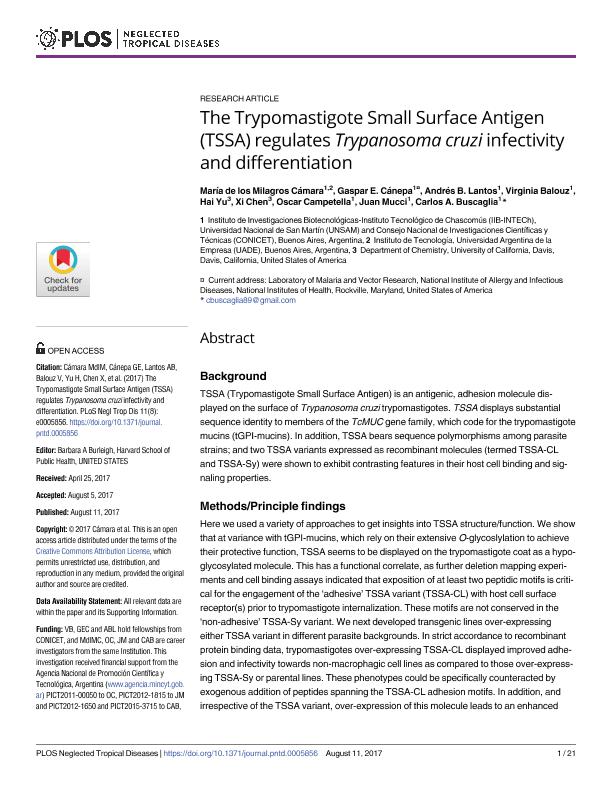Mostrar el registro sencillo del ítem
dc.contributor.author
Camara, María de los Milagros

dc.contributor.author
Canepa, Gaspar Exequiel

dc.contributor.author
Lantos, Andrés Bernardo Gabriel

dc.contributor.author
Balouz, Virginia

dc.contributor.author
Yu, Hai
dc.contributor.author
Chen, Xi
dc.contributor.author
Campetella, Oscar Eduardo

dc.contributor.author
Mucci, Juan Sebastián

dc.contributor.author
Buscaglia, Carlos Andres

dc.date.available
2018-11-02T20:09:30Z
dc.date.issued
2017-08
dc.identifier.citation
Camara, María de los Milagros; Canepa, Gaspar Exequiel; Lantos, Andrés Bernardo Gabriel; Balouz, Virginia; Yu, Hai; et al.; The Trypomastigote Small Surface Antigen (TSSA) regulates Trypanosoma cruzi infectivity and differentiation; Public Library of Science; Neglected Tropical Diseases; 11; 8; 8-2017; 1-21; e0005856
dc.identifier.uri
http://hdl.handle.net/11336/63552
dc.description.abstract
Background: TSSA (Trypomastigote Small Surface Antigen) is an antigenic, adhesion molecule displayed on the surface of Trypanosoma cruzi trypomastigotes. TSSA displays substantial sequence identity to members of the TcMUC gene family, which code for the trypomastigote mucins (tGPI-mucins). In addition, TSSA bears sequence polymorphisms among parasite strains; and two TSSA variants expressed as recombinant molecules (termed TSSA-CL and TSSA-Sy) were shown to exhibit contrasting features in their host cell binding and signaling properties. Methods/Principle findings: Here we used a variety of approaches to get insights into TSSA structure/function. We show that at variance with tGPI-mucins, which rely on their extensive O-glycoslylation to achieve their protective function, TSSA seems to be displayed on the trypomastigote coat as a hypo-glycosylated molecule. This has a functional correlate, as further deletion mapping experiments and cell binding assays indicated that exposition of at least two peptidic motifs is critical for the engagement of the ‘adhesive’ TSSA variant (TSSA-CL) with host cell surface receptor(s) prior to trypomastigote internalization. These motifs are not conserved in the ‘non-adhesive’ TSSA-Sy variant. We next developed transgenic lines over-expressing either TSSA variant in different parasite backgrounds. In strict accordance to recombinant protein binding data, trypomastigotes over-expressing TSSA-CL displayed improved adhesion and infectivity towards non-macrophagic cell lines as compared to those over-expressing TSSA-Sy or parental lines. These phenotypes could be specifically counteracted by exogenous addition of peptides spanning the TSSA-CL adhesion motifs. In addition, and irrespective of the TSSA variant, over-expression of this molecule leads to an enhanced trypomastigote-to-amastigote conversion, indicating a possible role of TSSA also in parasite differentiation. Conclusion/Significance: In this study we provided novel evidence indicating that TSSA plays an important role not only on the infectivity and differentiation of T. cruzi trypomastigotes but also on the phenotypic variability displayed by parasite strains.
dc.format
application/pdf
dc.language.iso
eng
dc.publisher
Public Library of Science

dc.rights
info:eu-repo/semantics/openAccess
dc.rights.uri
https://creativecommons.org/licenses/by-nc-sa/2.5/ar/
dc.subject
Trypomastigote Small Surface Antigen
dc.subject
Interaction
dc.subject
Invasion
dc.subject.classification
Otras Ciencias de la Salud

dc.subject.classification
Ciencias de la Salud

dc.subject.classification
CIENCIAS MÉDICAS Y DE LA SALUD

dc.subject.classification
Otras Ciencias Biológicas

dc.subject.classification
Ciencias Biológicas

dc.subject.classification
CIENCIAS NATURALES Y EXACTAS

dc.title
The Trypomastigote Small Surface Antigen (TSSA) regulates Trypanosoma cruzi infectivity and differentiation
dc.type
info:eu-repo/semantics/article
dc.type
info:ar-repo/semantics/artículo
dc.type
info:eu-repo/semantics/publishedVersion
dc.date.updated
2018-10-22T21:51:19Z
dc.identifier.eissn
1935-2735
dc.journal.volume
11
dc.journal.number
8
dc.journal.pagination
1-21; e0005856
dc.journal.pais
Estados Unidos

dc.journal.ciudad
San Francisco
dc.description.fil
Fil: Camara, María de los Milagros. Universidad Argentina de la Empresa; Argentina. Consejo Nacional de Investigaciones Científicas y Técnicas. Centro Científico Tecnológico Conicet - La Plata. Instituto de Investigaciones Biotecnológicas. Universidad Nacional de San Martín. Instituto de Investigaciones Biotecnológicas; Argentina
dc.description.fil
Fil: Canepa, Gaspar Exequiel. Consejo Nacional de Investigaciones Científicas y Técnicas. Centro Científico Tecnológico Conicet - La Plata. Instituto de Investigaciones Biotecnológicas. Universidad Nacional de San Martín. Instituto de Investigaciones Biotecnológicas; Argentina
dc.description.fil
Fil: Lantos, Andrés Bernardo Gabriel. Consejo Nacional de Investigaciones Científicas y Técnicas. Centro Científico Tecnológico Conicet - La Plata. Instituto de Investigaciones Biotecnológicas. Universidad Nacional de San Martín. Instituto de Investigaciones Biotecnológicas; Argentina
dc.description.fil
Fil: Balouz, Virginia. Consejo Nacional de Investigaciones Científicas y Técnicas. Centro Científico Tecnológico Conicet - La Plata. Instituto de Investigaciones Biotecnológicas. Universidad Nacional de San Martín. Instituto de Investigaciones Biotecnológicas; Argentina
dc.description.fil
Fil: Yu, Hai. University of California at Davis; Estados Unidos
dc.description.fil
Fil: Chen, Xi. University of California at Davis; Estados Unidos
dc.description.fil
Fil: Campetella, Oscar Eduardo. Consejo Nacional de Investigaciones Científicas y Técnicas. Centro Científico Tecnológico Conicet - La Plata. Instituto de Investigaciones Biotecnológicas. Universidad Nacional de San Martín. Instituto de Investigaciones Biotecnológicas; Argentina
dc.description.fil
Fil: Mucci, Juan Sebastián. Consejo Nacional de Investigaciones Científicas y Técnicas. Centro Científico Tecnológico Conicet - La Plata. Instituto de Investigaciones Biotecnológicas. Universidad Nacional de San Martín. Instituto de Investigaciones Biotecnológicas; Argentina
dc.description.fil
Fil: Buscaglia, Carlos Andres. Consejo Nacional de Investigaciones Científicas y Técnicas. Centro Científico Tecnológico Conicet - La Plata. Instituto de Investigaciones Biotecnológicas. Universidad Nacional de San Martín. Instituto de Investigaciones Biotecnológicas; Argentina
dc.journal.title
Neglected Tropical Diseases

dc.relation.alternativeid
info:eu-repo/semantics/altIdentifier/doi/http://dx.doi.org/10.1371/journal.pntd.0005856
dc.relation.alternativeid
info:eu-repo/semantics/altIdentifier/url/https://journals.plos.org/plosntds/article?id=10.1371/journal.pntd.0005856
Archivos asociados
